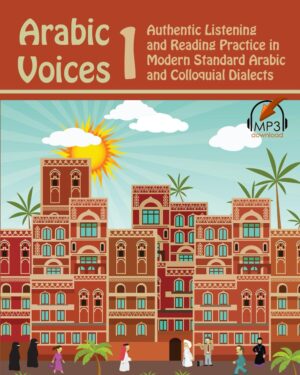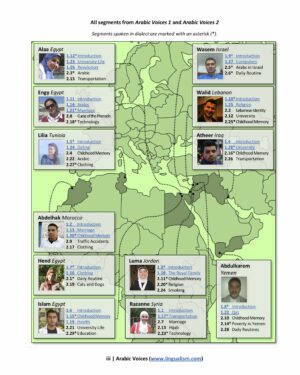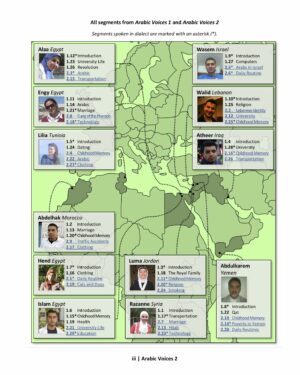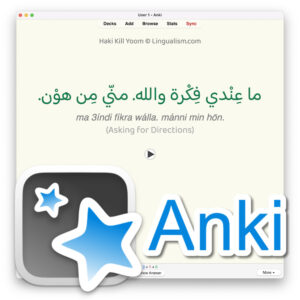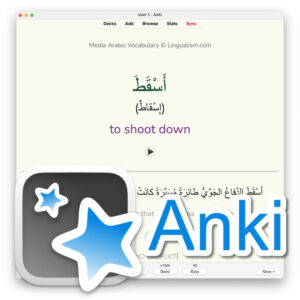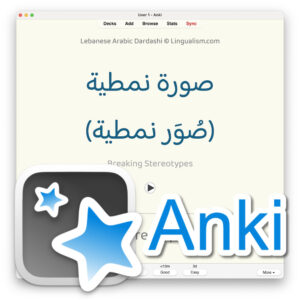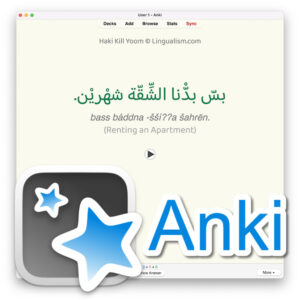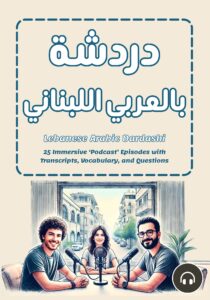Home » Modern Standard Arabic » Qat in Yemen–Abdulkarem
Qat in Yemen–Abdulkarem
| Greetings and welcome! [00:00] | السلام عليكم ورحمة الله وبركاته. أهلاً ومرحبًا بكم. | |
| In this video we will talk about what Abdulkarem said about the qat plant, chewing it, and farming it in Yemen, and we will comment on what different words and phrases he used. [00:04] | في هذا الفيديو سنتحدّث عمّا قاله عبد الكريم بشأن نبات القات، وتخزينه، وزراعته في اليمن، وسنعلّق على ما استخدمه من كلمات وعبارات مختلفة. | |
| We begin on page 123, specifically on line 2. [00:17] | ونبدأ في الصفحة المائة وثلاث وعشرين، وتحديدًا في السطر الثاني. | |
| Abdulkarem says, "Now I will talk to you about the topic of qat." Here he mentions a future action. [00:23] | يقول عبد الكريم: (الآن سوف أتكلم معكم عن موضوع القات) وهنا… وهو هنا يتحدّث عن أمر مستقبلي. | |
| When talking about a future action, you can use سوف (will): 'I will travel to Egypt.' [00:34] | وعند الحديث عن أمر مستقبلي، يمكنك أن تستخدم [سوف]، (أنا سوف أسافر إلى مصر). | |
| You can also use سـ (will): I will travel to Egypt). Whether you use سوف or just سـ, they both express the future. [00:42] | وكذلك يمكنك أن تستخدم [السين] للتعبير عن المستقبل، فيمكنك أن تقول (أنا سأسافر إلى مصر)؛ إذا ما استخدمت [سوف] أو حرف [ السين] فقط كلاهما يعبران عن المستقبل. | |
| So ... in this phrase you can say, "I will now talk to you about the subject of qat." [01:00] | فا… في هذه العبارة يمكنك أن تقول: (الآن سأتكلم معكم عن موضوع القات). | |
| Then we move on to line 4. Abdulkarem says, "Chewing qat is, in my opinion, a bad habit." [01:07] | ننتقل بعد ذلك إلى السطر الرابع—ويقول عبد الكريم: (ومضغ القات هي عادة في نظري أنا عادة سيئة). | |
| Here, Abdulkarem expresses his opinion, and uses the term في نظري. [01:16] | وهنا يعبر عبد الكريم عن رأيه، ويستخدم عبارة [في نظري]. | |
| You can use this phrase if you want to talk about your opinion. You can say في نظري; you can say في رأيي; you can say بالنسبة لي (as for me). [01:22] | ويمكنك استخدام هذه العبارة إذا ما أردت أن تتحدّث عن رأيك، فيمكنك أن تقول [في نظري]، يمكنك أن تقول [في رأيي]، يمكنك أن تقول [بالنسبة لي]. | |
| In my view, this is a bad habit; in my opinion, this is a bad habit; I think this is a bad habit, and so on, or as for me, this is a bad habit. [01:35] | (في نظري هذه عادة سيئة، في رأيي هذه عادة سيئة، بالنسبة لي أنا أرى أن هذه هي عادة سيئة، وهكذا، أو بالنسبة لي هذه عادة سيئة). | |
| Great! Then we move to line 8. And... where Abdulkarem says, "This method continues from 2 pm and extends until 8 or 9 pm." [01:50] | عظيم! ننتقل بعد ذلك إلى السطر الثامن—و… حيث يقول عبد الكريم: (وتستمر هذه الطريقة منالساعة الثانية ظهرًا وتمتد حتى الساعة الثامنة أو التاسعة مساءً). | |
| And here... Abdulkarem expresses something that takes a certain period of time and is used to express this time period حتى (until). [02:07] | وهنا يس… يعبر عبد الكريم عن أمر يستغرق مدة زمنية معينة، ويستخدم للتعبير عن هذه المدة الزمنية [حتى]. | |
| And حتى has many uses in the Arabic language; one of these uses is to talk about the end of a certain period of time. [02:19] | و[حتى] لها استخدامات كثيرة في اللغة العربية، أحد هذه الاستخدامات أن تتحدّث عن نهاية مدة زمنية معينة. | |
| You can say, for example, "I'm staying in the library from 8 am to 5 pm." And in this case, you can use إلى, as well. [02:29] | يمكنك أن تقول مثلًا: (أنا أمكث في المكتبة من الساعة الثامنة حتى الساعة الخامسة) وفي هذه الحالة يمكنك أن تستخدم [إلى] كذلك. | |
| You can say, "I stay in the library or stay in the library from 8 am to 5 pm." This is one of the uses of حتى. [02:41] | فيمكنك أن تقول: (أنا أبقى في المكتبة أو أمكث في المكتبة من الساعة الثامنة إلى الساعة الخامسة) وهذه أحد استخدامات [حتى]. | |
| Then we move to line 12. Abdulkarem says, "It is like a finger that is being picked and there are large leaves." [02:53] | ننتقل بعد ذلك إلى السطر الثاني عشر—يقول عبد الكريم (وهي بمثابة الأصبع الذي يتم قطفها وهناك أوراق كبيرة). | |
| Here, Abdulkarem explains the size of this paper and says it is like a finger, like the size of the finger, that is, the size of the finger. [03:04] | وهنا يشرح عبد الكريم حجم هذه الورقة فيقول وهي بمثابة الأصبع أي مثل حجم ال… الأصبع، أي كحجم الأصبع. | |
| You can use بمثابة or مثل or كـ to mean or use it for analogy, that is, its size, LIKE the size of the finger. You can use any of these words for analogy. [03:15] | يمكنك أن تستخدم [بمثابة] أو [مثل] أو حرف [ الكاف] لتعني أو لتستخدمهما للتشبيه، أي أن حجمها مثل حجم الأصبع، بمثابة الأصبع، كالأصبع، مثل الأصبع؛ ويمكنك استخدام أي من هذه الكلمات للتشبيه. | |
| Then we turn to line 15, where Abdulkarem says, "And not like drugs or liquor that lose the human mind." [03:38] | ننتقل بعد ذلك إلى السطر الخامس عشر—حيث يقول عبد الكريم: (وليس كما المخدرات أو الخمور التي تُفقد عقل الإنسان). | |
| Abdulkarem says here that drugs or alcohol lose the mind of a person, and this is a phrase that you can use to express drunkenness. [03:49] | يقول عبد الكريم هنا أن المخدرات أو الخمور تُفقد عقل الإنسان، وهذه عبارة يمكنك استخدامها للتعبير عن [السُكر]. | |
| If a person drinks alcohol, he loses his mind, that is, he becomes not fully aware, or that these drugs intoxicates him. [03:59] | فإن الإنسان إذا شرب الخمر يفقد عقله، أي يصبح ليس في وعيه التام، أو أن هذه المخدرات تُسكره. | |
| You can say تفقد عقله (lose his mind); you can say تُسكره (intoxicates him); you can also say تغيب عقله (makes him lose his mind). [04:08] | فيمكنك أن تقول [تفقد عقله]، يمكنك أن تقول [تُسكره]، يمكنك أن تقول كذلك [تغيب عقله... تغيب عقله]. | |
| Then we turn to line 21. Abdulkarem says, "because it gives you a chance to meet with your friends," and we often use, in Arabic, the word... [04:19] | ننتقل بعد ذلك إلى السطر الواحد والعشرون—ويقول عبد الكريم: (لأنه يعطيك فرصة بأن تجتمع مع أصدقائك) ونستخدم كثيرًا في اللغة العربية كلمة... | |
| With the word فرصة (opportunity), we use the verb يعطي (give), and then gives you the opportunity to do a certain job. [04:34] | مع كلمة [فرصة] نستخدم الفعل [يعطي] فأمرما يعطيك الفرصة للقيام بعمل معين. | |
| You can say, for example, "Staying in the library gives you the opportunity to... gives you more opportunity to read." [04:42] | فيمكنك أن تقول مثلًا: (البقاء في المكتبة يعطيك الفرصة ل... يعطيك فرصة أكثر للقراءة) | |
| We use the verb يعطي with the word فرصة in the sense 'allows you to do something.' [04:50] | فنستخدم الفعل [يعطي]مع كلمة [فرصة] بمعنى يسمح لك بفعل أمر ما. | |
| Then we move to line 25, where Abdulkarem says, "Therefore, there are many hospitals, especially in Jordan." [04:59] | ننتقل بعد ذلك إلى السطر الخامس والعشرون—حيث يقول عبد الكريم: (ولذلك هنالك أو هناك الكثير من المستشفيات خاصة في الأردن) | |
| And here Abdulkarem says that the matter is... that this is because of what he mentioned before. That this is the result of what he said before, or that this is because of what he said before. [05:11] | وهنا يقول عبد الكريم أن الأمر... أن هذا الأمر يترتب على ما ذكره من قبل، أو أن هذا بسبب ما ذكره من قبل. | |
| In this case you can use ولذلك (therefore), and you can also use ولذا. [05:24] | ويمكنك في هذه الحالة أن تستخدم [ولذلك]، كما يمكنك أن تستخدم [ولذا]. | |
| You can say for example, "I would like to learn Arabic; therefore, I will travel to Egypt or so I will travel to Egypt. You can use... use either one. [05:32] | يمكنك أن تقول مثلًا: (أنا أود تعلم اللغة العربية، ولذلك سأسافر إلى مصر أو ولذا سأسافر إلى مصر) أيًا منهما يمكنك استخدام... استخدامهما. | |
| You can use either of them in this case or in this context. [05:45] | يمكنك استخدام أيٍ منهما في هذه الحالة أو في هذا السياق. | |
| Then we move to line 27, where Abdulkarem says, "I advise many young people not to use qat." [05:52] | ننتقل بعد ذلك إلى السطر السابع والعشرون—حيث يقول عبد الكريم: (وأنصح الكثير من الشباب بعدم استخدام القات) | |
| Abdulkarem uses here the verb ينصح (advises) to give advice to someone. [06:04] | يستخدم عبد الكريم هنا الفعل [ينصح] لإعطاء نصيحة لشخص ما. | |
| You can use this verb to give advice, and if you use this verb, it is followed by the preposition بـ, [06:12] | يمكنك أن تستخدم هذا الفعل لإعطاء نصيحة، وعليك إذا استخدمت الفعل [ينصح] أن تُلحقه بحرف [الباء] | |
| so you say, for example, "I advise you to read; I advise you... or I advise you to keep studying," and so on. [06:21] | فتقول مثلًا: (أنا أنصحك بالقراءة، أنا أنصحك... أو أنا أنصحك بالمداومة على المذاكرة) وهكذا. | |
| So, you says 'I advise you بـ." It is necessary to use بـ with this verb. [06:32] | فتقول [أنصح بـ] لا بدّ من استخدام حرف [ الباء] مع الفعل [ينصح]. | |
| We then move to line 34, where Abdulkarem says, "Women there ... [06:40] | ننتقل بعد ذلك إلى السطر الرابع والثلاثون—حيث يقول عبد الكريم: (النساء فهناك... | |
| "As for women, there are few of them, but this custom has begun to spread among women." [06:47] | أما النساء فهناك القليل منهن، ولكن بدأت هذه العادة تنتشر في أوساط النساء). | |
| Abdulkarem uses the phrase في أوساط in the sense of بين (among). You can say here, 'the habit is spread...' or 'this habit has begun to spread among women.' [06:54] | يستخدم عبد الكريم هنا عبارة [في أوساط] بمعنى [بين] فيمكنك أن تقول هنا (تنتشر هذه العادة أو بدأت هذه العادة تنتشر بين النساء). | |
| You can also say, "Among women, this habit prevails, among women." This is common among women. This practice is widespread among women. Neither of these is true. In the middle, center, or between. [07:06] | كما يمكنك كذلك أن تقول (وسط النساء تنتشر هذه العادة، وسط النساء...، تنتشر هذه العادة في أوساط النساء، تنتشر هذه العادة بين النساء) أيًا منهما يكون صحيحًا [في وسط، وسط، أو بين] | |
| Great! Then we turn to line 36. "I wish with all my heart to find alternatives to the qat plant," Abdulkarem said. [07:25] | عظيم! ننتقل بعد ذلك إلى السطر السادس والثلاثون—حيث يقول عبد الكريم: (أتمنى من كل قلبي أن يتم إيجاد بدائل لشجرة القات) | |
| We use this phrase with the verb أتمنى (I hope) sometimes. We say, "I wish with all my heart..." [07:38] | ونستخدم هذه العبارة مع الفعل [أتمنى] أحيانًا. نقول أتمنى من كل قلبي... | |
| I hope with all my heart that God will help you. I hope with all my heart that you will be able to do so and so. [07:43] | أتمنى من كل قلبي أن يوفقك الله، أتمنى من كل قلبي أن يتيسر لك الأمر) وهكذا، | |
| And this phrase means that you are very keen that this thing you mention will happen. [07:51] | وهذه العبارة يعني تعني أنك حريص جدًا على حدوث هذا الأمر الذي تذكره. | |
| I hope with all my heart that you find these videos useful for you. [07:58] | أتمنى من كل قلبي أن تجدوا هذه الفيديوهات مفيدة لكم. | |
| Thank you very much, and see you well in another video. May the peace, mercy and blessings of God be upon you. [08:03] | أشكركم شكرًا جزيلًا، و ألقاكم على خير في فيديو آخر، والسلام عليكم ورحمة الله وبركاته. |
Video Lessons
Arabic Voices MSA Lessons
Arabic teacher Mostafa Ahmed takes us through segments in MSA from Lingualism's book Arabic Voices 1: Authentic Listening and Reading Practice in Modern Standard Arabic and Colloquial Dialects, explaining interesting points of grammar and vocabulary.
© 2024 Lingualism LLC

